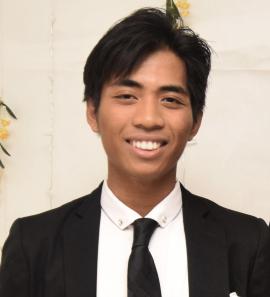By: Maya Reid
Add two double majors and two double minors and you get one December 2020 graduate. Justin Gausin double majors in Applied Mathematics and Cyber Security and double minors in Computer Science and Information Systems & Technology.
"I believe the most difficult hurdle in my time being a double major and a double minor was planning to finish my curriculum in the least time possible," said Gausin. That meant Gausin had to carefully plan his class schedule and work-life balance. "Starting sophomore year, I believe I took 16-18 credit hours for each regular semester (fall and spring)," said Gausin.
In 2019, Gausin participated as an undergraduate research intern funded by the National Science Foundation (NSF) at Old Dominion University. During this internship, Gausin was mentored by Dr. Hongyi Wu, Batten Chair Professor in Computer and Electrical Engineering and Director of the School of Cybersecurity, who tasked him to research homomorphic encryption, which later became the foundation of Gausin's research. "Double-majoring in cybersecurity and Applied Mathematics, Justin has unique talent of integrating deep mathematic thinking into cybersecurity research to solve nontrivial cybersecurity problems that lead to significant practical applications," said Professor Wu. From July 2020 to August 2020, Gausin was supposed to go to Washington D.C. to intern at the Department of Defense, Office of Cost Assessment and Program Evaluation (OSD CAPE). "Due to COVID, the senior officials at the Pentagon (my worksite) decided that we should all be teleworking for everyone's safety," said Gausin. Despite the pandemic, Gausin participated in competitive analytics on the private defense industry concerning aerospace and defense acquisitions. Recently, he's been interning at the Naval Sea Systems Command (NAVSEA) in Virginia Beach in cybersecurity.
Being flexible and remaining organized played a big part in Gausin's success as an undergraduate. His latest research puts privacy as his top priority. The most widely used solution for preserving the privacy of user information is to encrypt the data before being sent to the cloud. "Under conventional methods of encryption (AES, RSA, DES), the cloud would not be able to operate the encrypted data without the user's decryption key" said Gausin. However, sharing the decryption key to the cloud would not guarantee privacy."Homomorphic encryption was constructed to solve the issue of being able to operate on the encrypted data without forsaking privacy". By definition, Homomorphic Encryption is a ciphertext computation technology, which allows arithmetic operations on encrypted texts, resulting in the same results as evaluating it in plaintexts. "The project focused on encrypting a 3D triangular mesh using Fully Homomorphic Encryption and running a custom algorithm to smoothen rough edges within the mesh," said Gausin.
When conducting research, it is important to leave room for open-minded learning, which is where diversity plays a significant role. "Diversity allows everyone to empathize with one another irrespective of color, race, or ideologies," said Gausin. As an intern for OSD CAPE, Gausin said, "the Department of Defense was pushing for more diversity in higher positions." Diversity plays an important role to Gausin. At ODU, he is a part of the Asian Pacific American Student Union (APASU) which is a student organization that aims to expose students to the diversity and culture of Asia. Events such as Lunar New Year and The Multicultural Event are held year-round and are open to students around campus. APASU is an organization that is dear to Gausin and considers it to be a source for his closest friends. "In a time where hate, bias, and social injustice remain prevalent, diversity is one solution," said Gausin. He will receive his Bachelor of Science in December 2020, and after graduation, "I want to explore my career field by working full-time and see which path is right for me."




